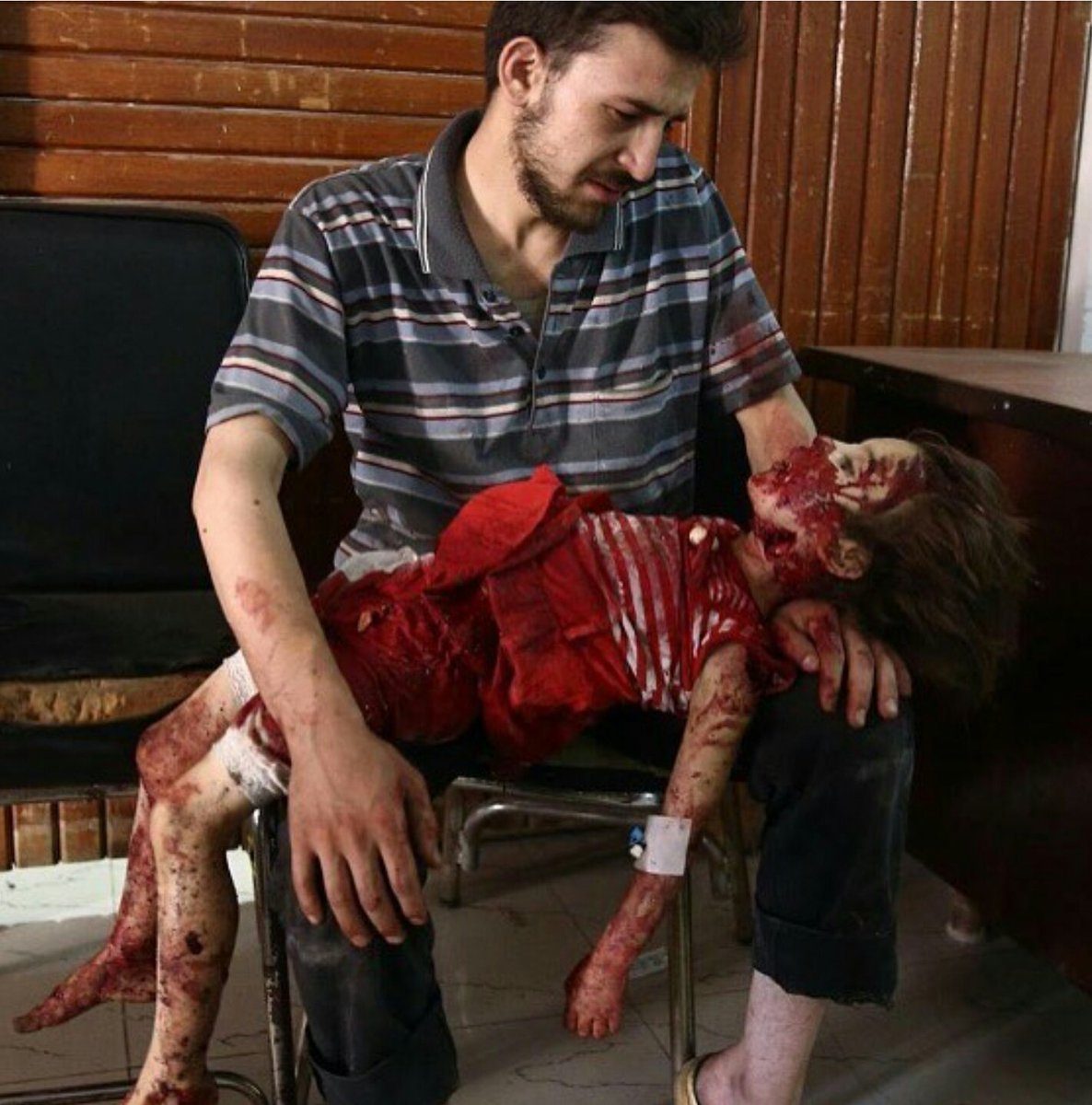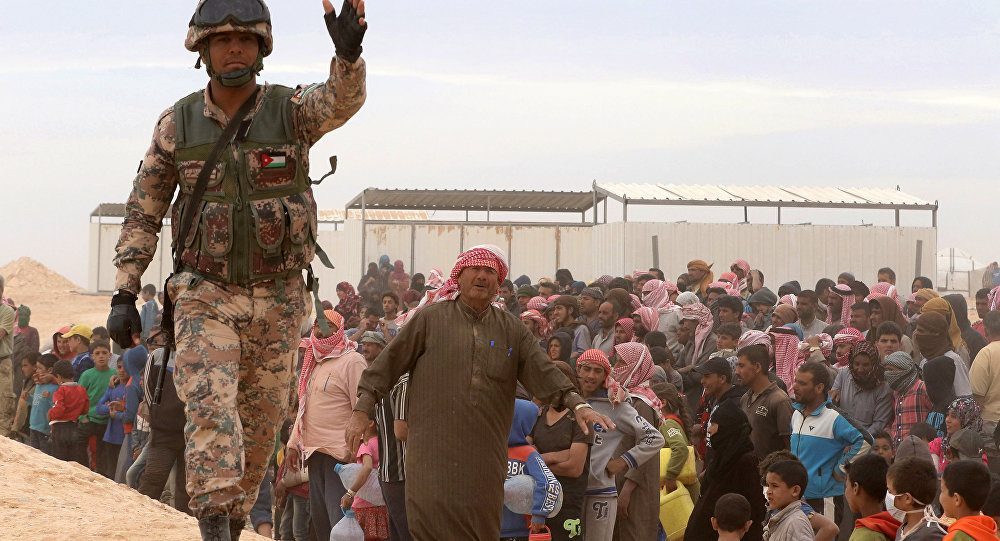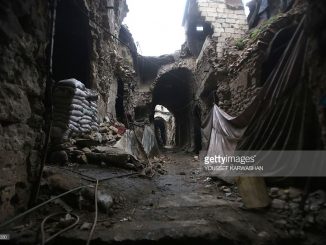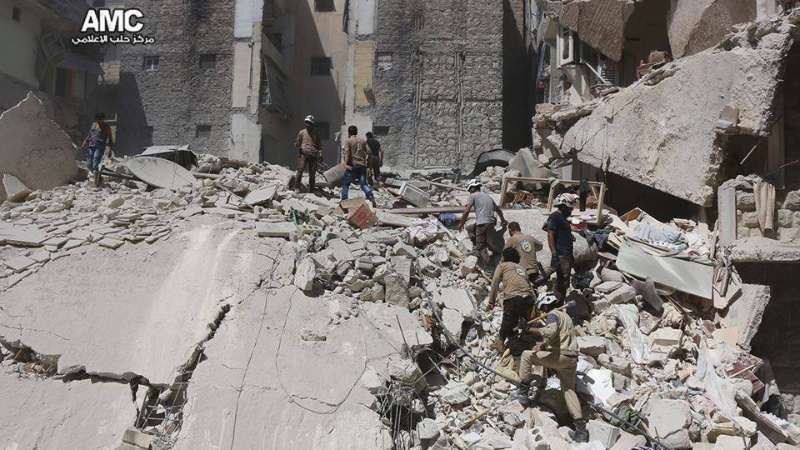
The ongoing battles in Aleppo harvested more civilian’s lives by both the government’s and opposition’s hands, while there seems no close to the clashes as both parts continue to put all they have to win the strategic area.
Assad regime, backed by Russia, said on September 22 it was starting a new wide offensive to recapture the rebel-held parts of Aleppo after a week-long ceasefire was declared officially over on 19 September.
Since 19 September, more than 800 civilians were killed and more than 2000 injured in rebel-held areas of Aleppo province, including the besieged eastern part of the city, Civil defense workers said.
There are about 275,000 people trapped by the siege of eastern Aleppo, where civilians are suffering through daily bombing, including by bunker-buster and incendiary weapons, and through starvation, as limited supplies run out and aid convoys are blocked from the city.
“We are living a real tragedy in east Aleppo,” a resident in Aleppo sayid. “We are short of everything, especially food and fuel. I had a shop that rented out chairs and tables for weddings. Of course, there was no business. We couldn’t find any medical aids or medicine since the beginning of the siege. We were deprived even of learning and education too.”
Picture from #Aleppo, can someone feel what this father is have ?
He just watch his daughter died in front his eyes ?
Aleppo my pain pic.twitter.com/0WPXVfL20X— Ahmad Alkhatib (@AhmadAlkhtiib) November 5, 2016
13 killed and 20 injured after a warplane targeted civilian homes with a parachute retarded bomb in Kafr Naha #Aleppo today. pic.twitter.com/bZEVidDBy0
— The White Helmets (@SyriaCivilDef) November 4, 2016
An airstrike targeted a civilian home, killing all family except for Jamal, 16. SCD were able to rescue Jamal after 5 hours.@SyriaCivilDef pic.twitter.com/SKnlqdgcRn
— Majd khalaf (@majdkhlafa19931) October 21, 2016
For the 6th day, #Aleppo #SCD teams have been recovering bodies buried under rubble in Ansari, 16bodies foundunder rubble. 25killed in total pic.twitter.com/ApWA3Q0dwq
— Raed Al Saleh (@RaedAlSaleh3) October 16, 2016
Moscow declared a halt to airstrikes on eastern Aleppo on Oct. 18, but Syrian and Russian warplanes have continued to strike around the city’s edges and in the surrounding province.
Russia’s defense ministry announced then on Wednesday 2 November a new humanitarian pause and said that six exit routes will be open on Friday for ten hours, from 9am to 7pm, to allow civilians in eastern Aleppo to leave, along with two new exit routes for the fighters to withdraw from the area.
However, the duration ended without any civilians evacuated and with no rebels surrendering.
“We are surrounded and if there are less civilians, there will be more food for the fighters. Almost all of the people here can’t leave for the regime areas, many have a family member in the FSA [the opposition Free Syria Army] or are connected to the FSA, which makes them blacklisted from the regime side,” a civlilian in Aleppo said.
Syrian state media and Russia’s defense ministry said rebels fired rockets at one of the eight passages open for civilians and rebels.
An official based in Aleppo in Syria’s reconciliation ministry said that “fighters from al Qaeda’s former Syria branch were preventing both rebels and civilians who wished to leave from doing so, and that factions appeared determined to fight on.”
After the end of the pause, reports by opposition sources said that the airstrikes have already started in the areas surrounding Aleppo.
Russian jet fighters perpetrated on Friday a new massacre in Kafr Naha town in Aleppo western countryside, killing tens of people and injuring many others, according to activists.
Residential areas in Kafr Naha town in Aleppo western countryside were targeted by parachute-borne bombs, which claimed the lives of 14 civilians and injured 25 others including women and children, activists said.
On Saturday, Russian airstrikes also hit the areas surrounding Aleppo killing more than 16 civilians according to opposition sources.
Footage from the activist-run Thiqa News Agency appeared to show missiles targeting the town of Darat Izza in northwestern Aleppo province. A team of the Syrian Civil Defense, known as the White Helmets, said at least seven people were killed in the airstrikes and 15 others were wounded. Other 10 civilians were killed in nearby areas.
There has been an intense aerial bombing campaign in the western Aleppo countryside and nearby Idlib province in recent days. Rebels said it appeared to be an attempt to sever their supply lines.
#شاهد بالصور|| اللحظات الأولى لاستهداف مدينة #الاتارب بصاروخ مظلي#وكالة_ثقة #ريف_حلب_الغربي #سوريا#thiqa_agency #Syria #Aleppo pic.twitter.com/3dn7T1pjmc
— وكالة ثقة (@thiqanewsagency) November 5, 2016
لحظة سقوط صاروخ مظلي على مدينة #دارةعزة بريف حلب الغربي https://t.co/f43GHnIUk2#سوريا #حلب#thiqa_agency #Syria #Aleppo#ملحمة_حلب_الكبرى pic.twitter.com/sgcFsta4Ev
— وكالة ثقة (@thiqanewsagency) November 5, 2016
آثار الدمار الحاصل في مدينة #دارةعزة نتيجة القصف بالصواريخ المظلية #وكالة_ثقة #ريف_حلب_الغربي #سوريا#thiqa_agency #Syria #Aleppo pic.twitter.com/Bbi0Cm0YbL
— وكالة ثقة (@thiqanewsagency) November 5, 2016
آثار الدمار الحاصل في بلدة #ابين سمعان نتيجة القصف بالصواريخ المظلية #وكالة_ثقة #ريف_حلب_الغربي #thiqa_agency #Syria #Aleppo pic.twitter.com/08ogwalYw2
— وكالة ثقة (@thiqanewsagency) November 5, 2016
Rebels’ offensive leaves 74 civilians killed.
Rebels opened a corridor to the east for the month of August after pro-government forces first applied a blockade in July, but they were not able to hold it as the government and its Russian ally pounded the gap with artillery and airstrikes. Pro-government forces reapplied the siege in early September.
On Friday 29 October the rebel forces started a new military operation to break the siege imposed on 275.000 civilians in eastern Aleppo, employing heavy shelling and suicide car bombs, was mainly focused on the city’s western edge by rebels based in the countryside outside Aleppo.
The offensive on the government-held part of Aleppo has killed at least 74 civilians, including 25 children according to the Syrian observatory of human rights.
In the first three days of the operations, the rebels were able to advance and seize new areas and their shelling on the regime-held areas killed 46 civilians at least including children.
However, the rebels’ attack was repelled in many fronts be Assad regime’s forces and the battles have slowed down after the fourth day.
On Thursday, rebel groups detonated three large car bombs near pro-government forces on the western edge of Aleppo, the Syrian Observatory for Human Rights and rebels said, as they tried to revitalize an offensive which has made little progress since taking most of Dahiyet al-Assad suburb on last Friday.
Assad regime also accused the rebels of using chemical weapons in their offensive.
Syrian state media said on last Monday that militants had fired shells containing chlorine gas at a residential area of the regime-held western part of the city, al-Hamdaniya. Rebels denied that, and said government forces had fired poison gas on another frontline.
The observatory said several civilians were reportedly suffering from breathing difficulties following the attack in al-Hamadaniyeh on Sunday, But it couldn’t not confirm or deny if this was due to use of toxins.
Rebel suicide-bombers opened up a new offensive on #Aleppo. City being shelled mercilessly.
We were on the front lines. Lucky to be alive pic.twitter.com/F4U7JhmanU
— Murad Gazdiev (@MuradGazdiev) November 3, 2016
Those photos will not be seen on MSM.
The victims of the terrorists’ chemical attack on #Aleppo #Syria pic.twitter.com/LBVJuuyGtK— maytham (@maytham956) October 31, 2016
Chlorine-filled barrel bombs dropped on al-Rashideen, Aleppo by Assad regime have left many civilians suffocating & struggling to breathe. pic.twitter.com/9FRcx4hczi
— هادي العبدالله Hadi (@HadiAlabdallah) October 31, 2016
The UN said that all parts are committing crimes against humanity in Aleppo
“All parties in Aleppo are conducting hostilities that are resulting in large numbers of civilian casualties and creating an atmosphere of terror for those who continue to live in the city,” U.N. human rights spokeswoman Ravina Shamdasani said.
“The reported use of ground-based missiles, along with the use of armed vehicles loaded with explosives, used in an area containing more than 1 million civilian inhabitants, is completely unacceptable and may constitute a war crime,” Shamdasani said.
“Strikes against hospitals, schools, market places, water facilities, and bakeries are now commonplace and if proven to be intentional may amount to war crimes.”
The United Nations envoy for Syria has also said he is “appalled and shocked” by intensive rocket shelling targeting civilians in Aleppo and killing dozens.
United Nations Envoy for Syria Staffan de Mistura said he was “appalled and shocked by the high number of rockets indiscriminately launched” on civilian suburbs of government-held Aleppo.
“Those who argue that this is meant to relieve the siege of eastern Aleppo should be reminded that nothing justifies the use of disproportionate and indiscriminate weapons, including heavy ones, on civilian areas and it could amount to war crimes,” de Mistura said.
The Assad regime forces, backed by Russian air power, Iranian ground forces and Shi’ite militia fighters from Iran, Iraq, and Lebanon, has been tightening its grip on rebel-held districts of Aleppo this year, and this summer achieved a long-held goal of fully encircling the area.
Recovering full control of the rebels’ last significant urban area would be the most important victory of the war so far for Assad, strengthening his control over Syria’s most populous and strategically important regions.



